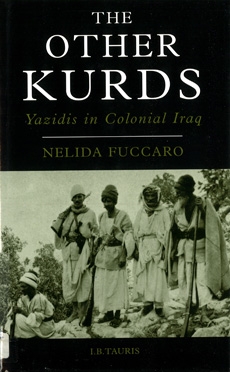|
ACKNOWLEDGEMENTS
A number of people made this book possible. Mario Fales had the splendid idea of launching this project years ago while sitting in one of the rooms of Palazzo Cappello, the former Venetian residence of the British archaeologist Sir Austen Henry Layard. Layard and Mario Fales had two common interests: archaeology and the Yazidi Kurds. To Mario my warmest thanks for his adventurous and inquisitive mind. Peter Sluglett made a crucial contribution to this book through his affectionate support, invaluable supervision and in-depth knowledge of Iraq. Abbas Vali and David McDowall patiently read the manuscript which has greatly benefited from their understanding of Kurdish politics and society and critical advice. None of these people is responsible for any shortcomings of this book.
I also wish to express my gratitude to a number of institutions. The Italian Ministry of Public Education supported generously this project, albeit through the intricacies and blind corners of Italian bureaucracy. The Centre for Arab Gulf Studies of the University of Exeter contributed to its final stages by providing financial and logistical support. I would like to thank the Public Record Office, India Office, and British Library in London whose personnel have been most efficient and understanding. Special mention goes to the late C. J. Edmonds whom I learnt to know through his personal papers kept in the Middle East Centre of Oxford university. The personnel of the archives of the French Ministry of Foreign Affairs in Paris and Nantes offered a most personalised and valuable service. In Paris Father Duval of the Dominican Library of Saulchoir tirelessly carried for me valuable boxes of delightful documents. Further, I found friends and support in the Kurdish Institute.
I have also benefited from the help of many individuals among colleagues and friends: Rashid Bandar, Joyce Blau, Christine Botte, Gokhan (^etinsaya, Maurizio Dal Corso, Piergiovanni Donini, Dick Douwes, the late Marion Farouk-Sluglett, Ulrike Freitag, Lia Ghilardi, the late John Guest, Hakim Helkawt, Salwa Ismail, Mark Keese, Philip Kreyenbroek, Maxine Levy, Zeynep Or and Cristina Tonghini. I should apologise for any omission in this list. I am immeasurably obliged to my family and to Shaalan for their forbearance, generosity and support.
Introduction
This book is a contribution to the study of Iraqi communal identities, as socially and politically constructed within specific historical frames. In particular it looks at the ways in which political, socio-economic and cultural solidarities among the Yazidis, a Kurdish heterodox community living in the north of the country, developed within the particular context of the period of the British mandate (1920—32). The book is also concerned with the late Ottoman period as a way to underline the continuity of socio-economic and political processes which define group dynamics. The study of a specific ethnic community should not represent a limitation in terms of a broad understanding of the complex and multi-layered nature of Iraqi society. Further, it should not be understood as another attempt at emphasising the fragmentation of the Iraqi social fabric which is often taken for granted. The construction of communal identities, as a process through which people re-frame solidarities, is viewed as an important sphere of action which provides groups with a continuous interaction with the surrounding environment rather than favouring separation from it. In fact solidarities are the by-product of a continuous exchange and ‘strategic’ negotiation between groups and the cultural, socioeconomic and political spheres within which their members operate. In this connection the Yazidi Kurds of Iraq are an extremely interesting case study as they functioned within several, and very often overlapping, frames of reference. The Iraqi Yazidis, and especially those of Jabal Sinjar with whom this study is particularly concerned, maintained a high degree of kinship ideology, but at the same time recognised themselves as members of village communities mainly devoted to agriculture and stock-farming which included sections of different Yazidi tribes. Furthermore, although they identified with moral and social values which were directly related to their heterodox creed, they qualified racially and linguistically as Kurds, a larger ethnic group which in the period under consideration was identified with Sunni Islam. As a tribe, a religious community and as a group with common socio-economic specialisation and racial affiliation the Yazidi Kurds of Iraq could operate in a variety of contexts which served different types of action: the family, the clan, the tribe, the religious polity and the wider ethnic community.
…..
| 